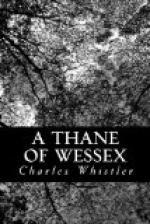“No men here,” said my comrade, “else would not yon birds be so quiet.”
But I could see no boat, and my heart sank somewhat; for nothing was there on this bank wherewith to make the raft of which Wulfhere spake.
Then said I: “Let us swim over and see what we can find.”
Now it was three hours after noon, or thereabouts, and the tide was running out very swiftly, and it was a long passage over. Nevertheless we agreed to try it, and so, going higher up the stream, we cast ourselves in, and swam quartering across the tide.
A long and heavy swim it was, but no more than two strong men could well manage. All the time, however, I looked to see some red-cloaked Dane come out from the trees and spy us; but there was none.
Then we reached the other bank, and stood to gain breath, for now we were in the enemy’s country, and tired as we were, we threw ourselves down in the shelter of a broad-stemmed willow tree, on the side away from the hill and village.
In a moment the collier touched my arm and pointed. On the crest of the hill stood a man, looking down towards us, but he was unarmed, as well as I could see, and, moreover, his figure seemed familiar. We watched him closely, for he began to come down towards us, and as he came nearer I knew him. It was one of the Combwich villeins—a fisher of the name of Elgar.
Now I would speak with him, for he could tell me all I needed; yet I knew not if he had made friends with the Danes, being here and seeming careless.
We lost sight of him among the trees, and the birds flew up, croaking, from them, marking his path as yet towards us; and at last he came from behind a half-burnt hut close to us. Then I called him by name.
He started, and whipped out a long knife, and in a moment was behind the hut wall again. So I knew that he was not in league with the enemy, but feared them. Therefore I rose up and called him again, adding that I was Heregar, and needed him.
Then he came out, staring at me with his knife yet ready. But when he saw that it was really myself he ran to meet me with a cry of joy and knelt before me, kissing my hands and weeping; so that it was a while before I could ask him anything. Very starved and wretched he looked, and I judged rightly that he had taken to the woods from the first.
Presently he was quiet enough to answer my questions, and he told me that at first the Danes had had a strong post on the hill above us; but that, growing confident, they had left it these two days. But there were many passing and repassing along the road, bringing plunder back to the ships. He had watched them from the woods, he said.
Also he told me that even now mounted men had ridden past swiftly, going to the ships, and from that I guessed that Eanulf’s force had been seen at least, and tidings sent thereof.
Then I asked him if any boats were left unburnt, and at that a cunning look came into his thin face, and he answered:




